River pollution: New phosphate rules hit thousands of planned new homes
Tens of thousands of new homes face being delayed or scrapped because of river pollution that could cost the economy £16bn.
Experts say more phosphate, found in animal and human waste, is getting into rivers and affecting water quality.
Tougher rules on phosphate river pollution targets have been brought in - but that could affect 100,000 new-build homes in England and Wales.
Developers want governments to take urgent action to find a solution.
The pollution is a problem partly caused by us and our demand for cheap food.
That demand has driven an industry that's threatening to overwhelm our environment, a BBC investigation has found.
Campaigners have said more needs to be done to save the UK's rivers before it's too late.
The building of more than 5,000 new homes are affected in Wales because of tighter phosphate pollution targets on rivers which were adopted in 2020. That could cost more than £700m to the economy.
'Delays could cost £16bn'
The Home Builders' Federation (HBF) contacted planning authorities and developers and calculated 100,000 homes in 74 areas in England are also affected by phosphate restrictions on housebuilding.
The HBF estimate the impact could be a £16bn loss in economic activity in England and Wales.
That figure is calculated from an industry standard model, factchecked by the BBC, that projects the financial footprint of new homebuyers, including spend in the local economy and taxes.
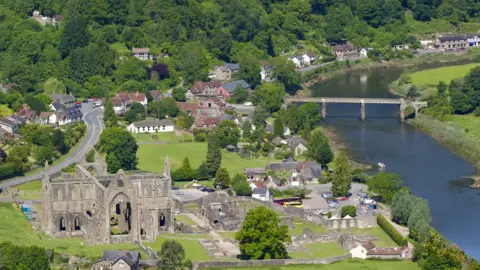 Getty Images
Getty Images"We have government agency-imposed moratoriums on house building across large swathes of the country for nutrient neutrality, despite house building being a minor contributor to the issue," said Stewart Baseley, executive chairman of the HBF.
"House building delivers growth, and it is crucial that the government re-evaluates the impacts of these costs and moratoriums and ensures that the industry is sufficiently supported such that it can deliver desperately needed new homes and the associated social and economic benefits.
"It is encouraging that after almost three years of home builders' pleas, the government seems to be looking to find solutions, but we need urgent actions that matches the scale and urgency of the issue."
'Serious damage'
Natural England, a UK government agency, said phosphate pollution is causing "serious damage" to rivers and wetlands - and the species that live in them - and made £100,000 available for each affected river catchment.
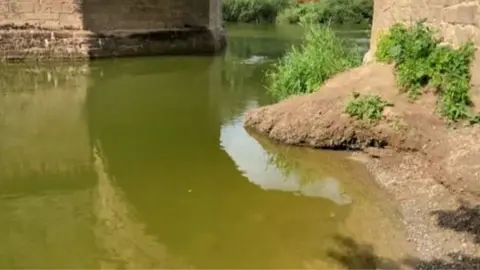
"These are also the same habitats that we need to protect us from the impacts of the climate crisis such as drought," said Melanie Hughes of Natural England.
"Their protection and enhancement underpins our economy and our wellbeing.
"Nutrient Neutrality is a way of making sure that new housing does not add to the problem by ensuring developers can take action to reduce pollution, such as by making new wetlands.
"Together with the government, Natural England is working closely with local authorities, developers and planning authorities to create those solutions so that much needed development can take place. This is happening now."
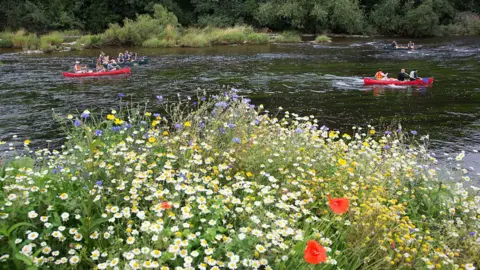 Getty Images
Getty ImagesWales' First Minister Mark Drakeford held a summit with farmers' representatives and water companies to discuss the impact of phosphate pollution on house building in the summer.
High levels of phosphate and other nutrients in rivers can lead to algal blooms and, ultimately, the loss of many species that make rivers their home, including fish, birds, invertebrates and plants that are vital to the river ecosystem.
BBC Wales Investigates has explored the problem on the River Wye that straddles the England and Wales border.
It is one of the UK's most ecologically diverse waterways and supports wildlife like salmon, otters and kingfishers.
Warning ecosystem will 'collapse'
The River Wye catchment is failing Joint Nature Conservation Committee targets and Natural Resources Wales (NRW) estimates almost three-quarters of phosphates entering the river are from rural land use, like farming.
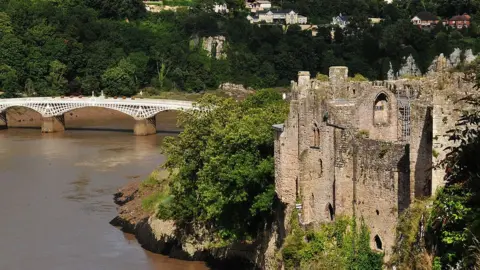 Getty Images
Getty Images"We cannot wait any longer," said Gail Davies-Walsh of charity Afonydd Cymru, which represents river trusts in Wales.
"Quite simply, if it carries on as it is now, that ecosystem will just collapse.
"It is salvageable, but it is going to take a huge amount of working together, and it's going to require all of those sectors to play their part in this and what we see at the moment is actually quite a lot of delays in that happening."
Is pollution because of intensive farming?
Campaigners believe intensive poultry farming is responsible.
Data gathered by the Campaign for the Protection of Rural Wales has found that, since 2008, more than 300 intensive poultry farms and farm extensions have been given planning permission in Powys, which covers a large area of the Wye.
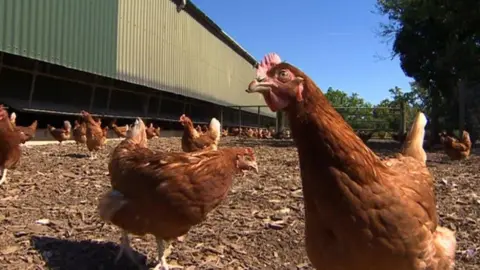
But water quality monitoring has not been able to prove a direct link between phosphates in the river and chicken farms.
"Agriculture is part of the problem," National Farming Union Cymru President Aled Jones told the BBC Wales Investigates programme.
"It's a very complex issue. There are so many other contributors to the water failing in these rivers.
"We need to go with the evidence. And as that evidence is clarified, clearly, then we will respond."
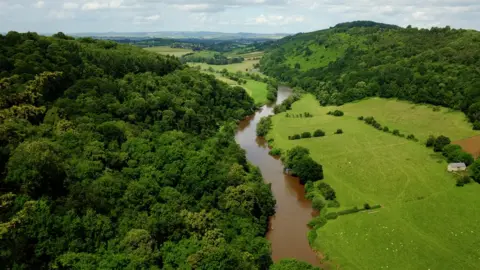
Water monitoring across the UK is limited but a team at Lancaster University modelled how much muck is being generated in the Wye catchment.
They found 7,500 tonnes of phosphorus is generated in the River Wye catchment every year from animal muck.
Crops in that area can only absorb around 4,500 tonnes of that muck - leaving a surplus.
"Fundamentally, if you have a surplus, you have too much phosphorus in your environment, it's likely that you're going to have worse water quality," said Dr Shane Rothwell of Lancaster University.
Can a manmade wetlands stop river pollution?
Near the Wye in Herefordshire, building has started on the first wetlands in the UK to be funded by developers buying what is being described as "phosphate credits".
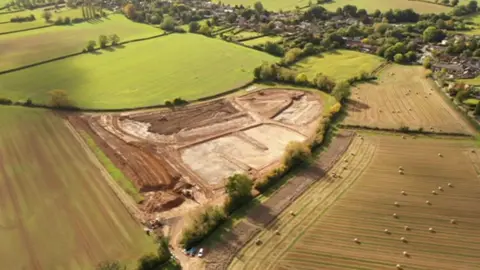
Such measures aim to stop putting more nutrients, like phosphate, into rivers - similar to carbon offsetting.
The wetlands in the village of Luston, near Leominster, should prevent 200kg of phosphate going into the river every year.
Developer Merry Albright has 52 house builds on hold due to the phosphate restrictions but is benefitting from the wetlands scheme.
'Developers don't mind doing more for biodiversity'
She said: "New housing didn't cause this problem and yet we are being blamed and also being asked to pay for a solution which won't really fix the bigger problem.
"I'm happy to do the best for the environment so I'm not seeking someone to eradicate the red tape but I would like people to focus on what caused this and what is needed to be done to fix it."
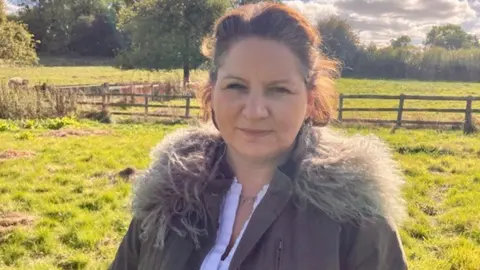
In England, Defra said they have tripled their workforce in the last two years and increased farm inspections from 300 to 1700 a year. They added they plan to expand to 4,000 inspections annually.
In Wales, it's NRW's job to enforce water quality regulations. They are negotiating with Welsh government to get extra funding to police the new pollution rules.
"It is key having people on the ground to deliver," said Siân Williams of NRW.
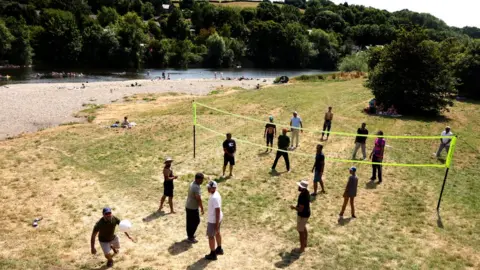 Reuters
Reuters"That's why we're looking into not just external funded programmes that are temporary, but we're also looking at our baseline funding with Welsh government."
Wales' Rural Affairs Minister Lesley Griffiths said the Welsh Government had already been working to make "quick gains" as well as long term solutions.
"Of course, I'm part of the solution, just as other people are," she said. "We all have to take responsibility each and every one of us."
- Wales Investigates: What's Killing our Rivers, is on BBC iPlayer and BBC One Wales at 8.30pm on Monday.

- WHAT'S KILLING OUR RIVERS?: Wyre Davies investigates what and who is to blame
- X-RAY: The Welsh consumer show fighting for YOUR rights

